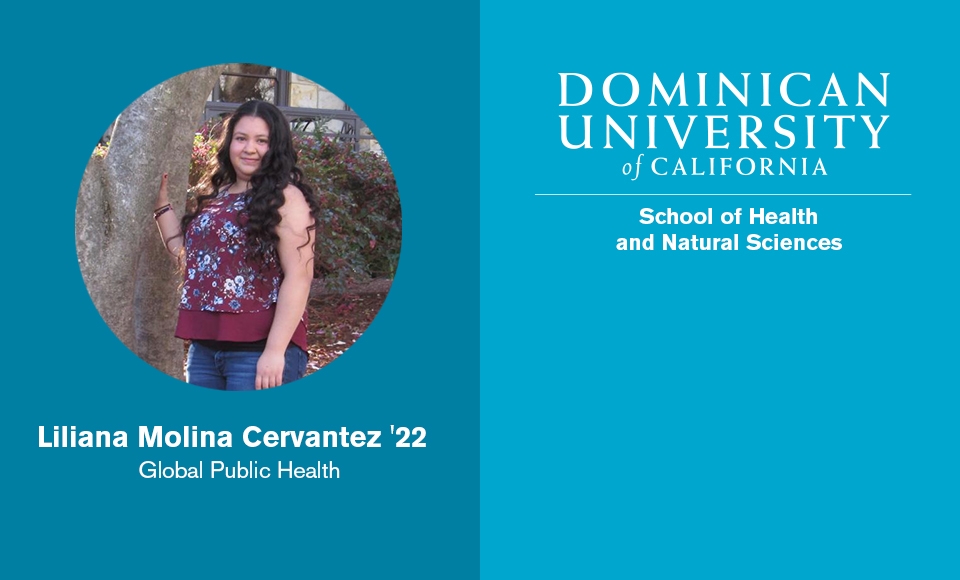Breadcrumbs
- News
- News Archive
- Alumna Inspired By Global Public Health Research Project

Students in Dr. Michaela George’s Health Research Methods class at Dominican University of California are measuring the impact of a unique group therapy program designed to protect the bond between domestic violence survivors and their children. The project is allowing the Global Public Health (GPH) students to put their public health skills into action – from developing measurement tools and research protocol to interviewing subjects and presenting findings.
For GPH graduate Liliana Molina Cervantez ’22, the work also has led to a full-time job.
The GPH faculty and students are involved in a three-year project to measure the impact of the In This Together (ITT) program developed in 2015 by Marin-based nonprofit Center for Domestic Peace (C4DP). ITT has helped hundreds of families heal together while improving the relationship between children and their non-abusing parent. However, the program had not been empirically studied.
After receiving a multi-year national demonstration grant from the Administration for Children and Families last year, C4DP contacted Dr. Patti Culross, assistant professor and director in Dominican’s GPH Department in the School of Health and Natural Sciences, to develop evaluation protocols and measures.
Both Dr. Culross and Dr. George immediately saw an important real-world learning opportunity from the ground up.
“Given that this is new research –nothing has been published on this curriculum – we had to come up with measurement tools and protocol that would test to see whether or not the intervention worked,” Dr. George says.
“We also did a lot of training. C4DP came to class and worked with students to train them to speak with the survivors of domestic violence. This really was a case of bringing research into the classroom.”
EXPLORE OUR UNDERGRADUATE PROGRAMS
Liliana began working on the basis of the project her junior year in the Health Research Methods course. The following summer, both Liliana and Nancy Bethsamet Hernandez ’22 worked with Dr. George to pilot the project. They reviewed additional literature to identify tools and then finalized rating scales and qualitative questions to measure the outcomes C4DP was interested in – the impact on the bond between survivor parent and child.
The pilot study covered two cohorts of ITT (10 weeks of online group therapy sessions in both English and Spanish), with 14 parents and eight children participating. During an intake session, the families answered a series of questions in order to establish a baseline. Then, bilingual Dominican students met with the parents and the children after each of the 10 sessions in order to capture qualitative insight. The sessions were similar to focus groups, with questions focusing on what the families were learning and how they are integrating this work into their daily life.
After a 10-week ITT cohort, the students followed up with a set of questions that would allow them to measure change from the intake session. Initial findings confirm the program’s impact. The non-abusing parent (all women in the initial study) reported an improvement in their emotional awareness and problem-solving skills, with an improved ability to regulate their own emotions. Almost all reported a renewed sense of motivation to be active and engaged parents, and all saw vast improvements in a more supportive family environment. Every child in the study reported a more positive relationship with their survivor parent.
The project is ongoing, with students now working with the fifth cohort of parents and families.
For Liliana, the work allowed her to draw on the skills she had learned in class, including comprehensively reading and critiquing peer-reviewed journal articles, submitting an IRB application, composing a scientific abstract, applying a mixed methods research approach, collecting data, interpreting the results.
Liliana and Nancy presented their work at Dominican's Scholarly Works Conference, as well as at the 2022 Society for Epidemiologic Research Conference in Chicago.
“This research experience really helped me grow as an individual while strengthening my public health skills, and confirming I made the right decisions in attending Dominican University and choosing to study Global Public Health,” Liliana says.
It was this type of opportunity that drew Liliana, who grew up in Calistoga, to Dominican in the first place.
“One of the main reasons I decided to attend Dominican University of California was because of the student-faculty ratio and knowing that I would actually feel supported by professors,” she says. “I loved the idea of having small classes and being able to build connections with professors and other students. Also seeing the campus in person helped me decide because who wouldn't want to attend such a peaceful and beautiful campus.”
After graduation, Liliana was hired as the ITT Bilingual Program Administrator. She has since been appointed as C4DP’s Bilingual Case Manager.
“My first few months as the ITT Bilingual Program Administrator has involved working with domestic violence survivors in connecting them with resources, supporting survivors' and their children's mental health needs, while also providing safety planning if needed,” she says.
In her new role, Liliana provides case management for the therapy programs that are offered by Center for Domestic Peace, conducts survivor intakes, screenings, and assess survivor needs.
“My time at Dominican has prepared me by gaining valuable experience when talking with domestic violence survivors and understanding the importance of sensitivity and cultural awareness, she says. “Thanks to my time at Dominican University of California, I have about a year of research experience in conducting interviews and focus groups with survivors as part of my responsibility of working on the evaluation team to evaluate the In This Together program.”